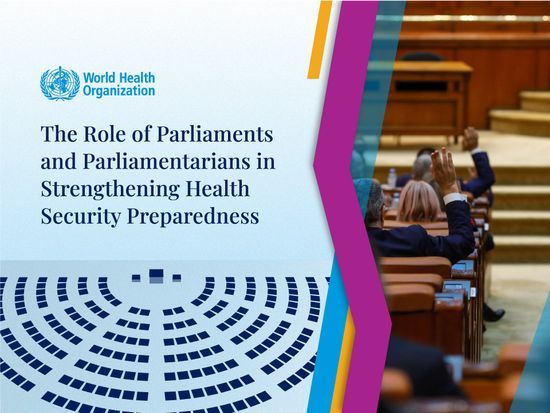
Parliaments and parliamentarians play a unique and powerful role in achieving health security preparedness through their various responsibilities: law-making, oversight, budgetary allocation, and citizen representation. High-level reviews of the response to the COVID-19 pandemic emphasized the importance of state capacity, social trust, and leadership when it comes to health emergency preparedness. Parliaments and parliamentarians are extremely well positioned to support, build, and strengthen these three aspects.
Language: English
English
Health topic
Course information
This course is also available in the following languages:
Español - Français - 中文 - Русский - العربية
Overview: This course delineates the role of parliaments in fortifying health emergency preparedness and health security, developed based on the handbook titled "Strengthening health security preparedness: The International Health Regulations (2005)" jointly published by WHO and the Inter-Parliamentary Union (IPU).
The International Health Regulations (IHR 2005) are legally binding for all countries, mandating the establishment and maintenance of core capacities for surveillance and response to public health risks and emergencies. These regulations aim to prevent, protect against, control, and respond to the international spread of disease in ways that align with public health risks, while minimizing interference with international traffic and trade.
As outlined in the 2021 WHA 73.8 Resolution on Strengthening Preparedness for Health Emergencies: Implementation of the International Health Regulations (IHR 2005), WHO Member States have acknowledged the fundamental role of parliaments in enhancing capacities to prevent, detect, and respond to public health risks, as well as in promoting and adopting the IHR (2005). Furthermore, they have emphasized the importance of parliaments in facilitating all-inclusive multisectoral coordination for health emergency preparedness.
Effective response to health emergencies necessitates thorough multisectoral preparedness coordination. Parliaments and parliamentarians are pivotal in this regard. This course provides participants with an in-depth understanding of how parliamentarians can utilize their diverse roles and positions to advocate, lead, and prioritize improved emergency preparedness and health security. Leveraging parliamentary functions such as law-making, oversight, accountability, and budgetary approval, alongside individual opportunities as representatives and community leaders, is essential to ensuring that emergency preparedness remains a priority and that the devastating impact of COVID-19 and other health emergencies is mitigated. Participants will receive practical suggestions, actionable recommendations, and additional resources for parliamentary engagement to bolster health emergency preparedness.
Course duration: Approximately 1.5 hours.
Certificates: A Certificate of Achievement will be available to participants who score at least 80% of the total points available on the quiz. Participants who receive a Certificate of Achievement can also download an Open Badge for this course. Click here to learn how.
Acknowledgments: This e-learning course is developed by the Multisectoral Engagement for Health Security (MHS) Unit of the Health Security Preparedness (HSP) Department of the World Health Organization (WHO).
For more information, please contact:
- Mr Ludy Suryantoro, Head of Multisectoral Engagement for Health Security Unit, suryantorol@who.int
- Ms Romina Stelter, Technical Officer, stelterr@who.int
- Ms Helen Versland, Technical Officer, verslandh@who.int
What you'll learn
- Explain the various global and domestic functions of parliaments and parliamentarians to help achieve health emergency preparedness and health security.
- Recognize the unique role of parliaments and parliamentarians in advocating for and achieving health emergency preparedness and health security.
- Explain practical suggestions, actionable recommendations, and further resources.
Who this course is for
- The primary audience for this course includes parliamentarians, parliamentary staff, government officials, members of international organizations, and individuals working with or interested in working with parliaments, parliamentarians, as well as those involved in health emergency preparedness and health security.
Enroll me for this course
Certificate Requirements
- Gain a Record of Achievement by earning at least 80% of the maximum number of points from all graded assignments.
- Gain an Open Badge by completing the course.